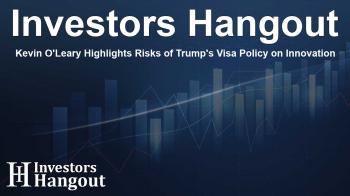Kevin O'Leary Highlights Risks of Trump's Visa Policy on Innovation

Understanding the Impact of Visa Fees on Innovation
Investor Kevin O'Leary has raised alarm over President Donald Trump's implementation of a hefty $100,000 fee for H-1B visas, a policy that he believes could significantly hinder the growth of American innovation. O'Leary, prominent for his role on 'Shark Tank', shared his views extensively, citing potential consequences for the nation's startup ecosystem.
The Dangers of Losing Talent
In his posts on X, O'Leary emphasized the fears that talented individuals might seek opportunities abroad instead of within the United States due to the increased financial burdens posed by the visa fee. He poignantly reflected on the origins of major tech firms like Apple Inc. (NASDAQ: AAPL), Oracle Corp (NYSE: ORCL), and Alphabet Inc. (NASDAQ: GOOG, GOOGL). According to him, these companies, which began their journeys in humble garages, might never have achieved their monumental success under the current immigration rules.
Lost Opportunities for Future Entrepreneurs
O'Leary expressed his concerns that the new H-1B policy might discourage innovative thinkers from even attempting to start their own businesses in the U.S. He remarked, "What this does is hurt innovation long-term," advocating that the United States must not squander its investment in the education and training of top international students only to send them packing once they graduate.
The Administration's Justification
In defense of the policy, administration officials contended that the increased H-1B visa fee would prioritize American workers while reducing dependence on immigrant labor. They clarified that while the fee is substantial, it isn’t an annual tax but rather a one-time filing charge for new applicants. Current visa holders and renewal applications will not be affected by this new levy.
Reactions from the Tech Community
The response from the tech industry and academia has been mixed. Andrew Ng, co-founder of Google Brain, pointed out that such a policy creates an atmosphere of uncertainty which is detrimental to attracting skilled talent. He stated, "America should be working to attract more skilled talent, not create uncertainty that turns them away." Economist Paul Krugman echoed similar sentiments, criticizing the decision and suggesting it could lead to a downward spiral in the nation's innovative capabilities.
Support from Some Tech Leaders
However, not all voices in tech are opposed to this policy. Reed Hastings, co-founder of Netflix Inc. (NASDAQ: NFLX), offered support for the fee, arguing that it would ensure that H-1B visas are allocated to higher-value positions, effectively reducing the need for the current lottery system.
Implications for Major Corporations
The consequences of this policy will likely ripple through major corporations and could alter their recruitment strategies. Major companies must now reassess their talent acquisition processes while considering the financial implications posed by the visa fee.
Conclusion
As the debate around the H-1B visa fee unfolds, the general sentiment remains that America must carefully navigate its immigration policies to foster a conducive environment for innovation. Kevin O'Leary's warning serves as a reminder of the great potential we risk losing if entrepreneurship is stifled by financial barriers.
Frequently Asked Questions
What is the primary concern regarding the $100,000 H-1B visa fee?
The main concern is that the high fee could drive talented innovators to start their businesses in other countries, thus stifling American innovation.
Which companies did O'Leary mention as examples of successful startups?
The companies highlighted include Apple Inc., Oracle Corp, and Alphabet Inc., which all began their journeys in garages before becoming industry giants.
What is the Trump administration's defense of the new visa fee?
The administration claims that the higher fee prioritizes American workers and reduces reliance on immigrant labor, clarifying it as a one-time fee for new applicants only.
How has the tech community reacted to the changes in the H-1B visa policy?
The reaction has been mixed, with some supporting it as a means to allocate visas to higher-value jobs, while others warn that it creates uncertainty and risks driving talent away.
What potential long-term effects could result from this policy?
Long-term effects may include a decrease in innovation in the United States as promising entrepreneurs and skilled workers opt to move to countries with more favorable immigration policies.
About The Author
Contact Dylan Bailey privately here. Or send an email with ATTN: Dylan Bailey as the subject to contact@investorshangout.com.
About Investors Hangout
Investors Hangout is a leading online stock forum for financial discussion and learning, offering a wide range of free tools and resources. It draws in traders of all levels, who exchange market knowledge, investigate trading tactics, and keep an eye on industry developments in real time. Featuring financial articles, stock message boards, quotes, charts, company profiles, and live news updates. Through cooperative learning and a wealth of informational resources, it helps users from novices creating their first portfolios to experts honing their techniques. Join Investors Hangout today: https://investorshangout.com/
The content of this article is based on factual, publicly available information and does not represent legal, financial, or investment advice. Investors Hangout does not offer financial advice, and the author is not a licensed financial advisor. Consult a qualified advisor before making any financial or investment decisions based on this article. This article should not be considered advice to purchase, sell, or hold any securities or other investments. If any of the material provided here is inaccurate, please contact us for corrections.

